New York Jewish Film Festival—January 9-22

Senior Film Critic Kurt Brokaw’s recommendations at Lincoln Center
You’ll find a generous slice of Manhattan’s Upper West Side Jewish community—grandparents, teachers, deli dwellers, union workers, religious scholars, Red Diaper babies, plus NYJFF fans from all five boroughs—Q-ing up at New York’s premiere showplace, the Walter Reade theater, for this 28th annual festival. Co-sponsored as usual by The Jewish Museum and The Film Society of Lincoln Center, the main slate of 19 narrative dramas and documentaries, plus six shorts, will be holding their world, U.S. or New York premieres.
They’ll be joined by Opening Night (Eric Barbier’s Promise At Dawn), Centerpiece (Yehonatan Indursky’s Autonomies) and Closing Night (Bille August’s A Fortunate Man) selections, four restorations, and several live presentations on creating for television as well as a news media panel examining the modern-day impact of Joseph Pulitzer.
Who Will Write Our History; Roberta Grossman; Poland/USA 2018; 95 min.
The most profound and continuing subject of the NYJFF’s nearly three decades has been the Holocaust. It is the “never again” issue that will never go away. The topic of writer/producer/director Roberta Grossman’s startlingly original docudrama is Where did the three million Polish Jews who were murdered come from? It turns out that half a million women, children, and men of the six million who perished in the Shoah came from the Warsaw ghetto. Only one Polish Jew in 100 survived the second World War.
But a tiny band of Jewish intelligentsia, mainly journalists, teachers, social workers and rabbis, preserved meticulous daily records of a persecuted people hiding and starving in Warsaw’s ghetto. All told, 60,000 penned or typed words were assembled over three years and hidden in three secret underground archives. Diaries, memoirs, and photos were carefully entombed like time capsules in sturdy cardboard boxes and milk cans. Russian bombers turned Warsaw into ruins in 1944 and helped force Germany’s surrender a year later. Two archives were discovered in 1946 and 1950 (the third is believed to be under today’s Chinese embassy in Warsaw). This is Grossman’s indelible contribution to a never-ending conversation.
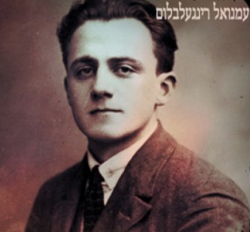
Based on Trinity College history professor Samuel D. Kassow’s book, Who Will Write Our History benefits from the on-camera presence of Kassow, University of Ottawa’s Jan Grabowski, and Jewish Theological Seminary scholar David Roskies. They adroitly lay out the framework of the increasingly dire straits Jews slipped into during the Nazi takeover of Warsaw in 1939.
Grossman divides her attention between two resistance leaders: Foremost was Emanuel Ringelblum, who had worked for an American Jewish aid committee and established the soup kitchens that eventually sustained thousands. Ringelbaum put together over 80 topics that Jews wrote about, eventually forming the 35,000 page Oyneg Shabes archive. Another important resistance figure was Rachel Auerbach (1903-1976), a journalist/historian who ran a kitchen and eventually escaped, one of just three survivors active in Ringelblum’s project.
Auerbach is acted with perfect stoicism by Jowita Budnik and voiced by Joan Allen, and Ringelblum, acted by Piott Glowacki and voiced by Adrian Brody, is equally credible. Both admirably underplay their roles and thus stay composites of a doomed population. Their dramatic scenes, shot in color, are intercut with black-and-white Nazi propaganda footage designed to denigrate and humiliate Jews.
The escalating violence of the Nazis contrasts vividly with Ringelblum’s urgency in assigning and collecting the written history that posits truth to overwhelming power, shown in the Nazi clips that portray Jews as sickly and impoverished. Grossman’s dramatic re-creations are cast, costumed, and mounted with extraordinary sensitivity and care, and you’ll keenly sense the contributions of her executive producers, Nancy Spielberg and Ronald S. Lauder. There’s a spectacular flea market re-creation in the ghetto illustrating how 400,000 Jews—30% of Warsaw’s population trapped in less than 3% of its area— sold their wedding dresses, jewelry, nearly all their possessions to visiting Poles who were only slightly better off in their own partitioned neighborhood.
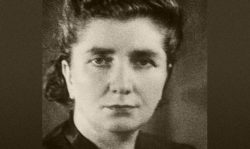
A note in the film’s opening attests to “the words spoken by the actors are from the secret archives.” As the indignities and cruelties of Hitler’s militia mount into public executions, and as Auerbach writes that she’s feeling “like a passenger on a sinking ship,” the eyewitness proofs of everyday life—illness and hunger in the bunker…underground schools and libraries, even theatrical presentations…deportations to the death camps of Triblinka…as all this takes place, the sheer ability “to live and die with honor” becomes an imperative. Ringelblum and his family were betrayed by an informer and murdered shortly after the three archives were safely buried underground.
Grossman’s previous documentary Above and Beyond (2014) on the aging members of the first-generation Israeli Air Force “band of brothers,” was also a critic’s choice. The director is bold and forthright about her responsibility as a filmmaker: “The most important questions I ask myself are these: l. Is the story I am considering making a film about a story that has already been told? If not, 2. Is it a story that will significantly add to the understanding off the Holocaust and to the archiving of Jewish memory? Even if the answer to both questions is ‘yes,’ the final question for me is: 3. Can I live with myself if I do not tell this story? If the answer is ‘no,’ I have to spend the next three or four years of my life telling a devastating story.”
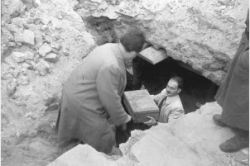
In the major image above, Budnik the actress holds what is probably Rachel Auerbach’s actual ration card, one example of the tiny pieces of a secret society Ringelblum called a “band of comrades,” preserved in the archive. Oyneg Shabes means Joy of the Sabbath, expressed in the personal belongings and documents archived in the YIVO Institute for Jewish Research in Manhattan, Yad Vashem in Jerusalem, and the Jewish Historical Institute in Warsaw. The photo shown here, taken in 1946, is one of the tin boxes, tied with string, being removed by Jewish and Polish searchers who tunneled under the ruins of a Warsaw school.
Who Will Write Our History has a new, permanent place in Jewish history.
Who Will Write Our History shows Thurs. Jan. 17 at 3:30pm and 8:30pm. Q&As follow with R.Grossman and N.Spielberg. S. Kassow and J.Allen join the 8:30pm Q&A.
Five Years After The War; Samuel Abaric, Martin Wiklund; France, 2017; 17 min.
Label this short ‘daddy-issues-with-a-difference.’ Speaking in French, the animated drudge, Tim, shown here, is lamenting how he, like his favorite superheroes (Batman, Spiderman, Harry, Luke) grew up with no father or an absent father. He explains his French Jewish mother hooked up with a non-Jewish Iraqi father, Jaffar, a political refugee with no papers. Tim remembers Jafar was the bad guy in Aladdin. Oy—same story? Still, he’d like to meet his dad one day.

This is less than a promising beginning for a 17-minute short, but stay with us. Mom persuades Tim to extinguish his joints, turn off the soccer matches and cartoons, and go to Talmad Torah. A classmate there recommends the movie Rabbi Jacob, an animated fantasy about a revolutionary Arabic hero in exile who disguises himself as a Jewish rabbi to survive. At this point directors Abaric and Wiklund begin intercutting wildly and richly fashioned action sequences, like some exotic hybrid of Waltz With Bashir and Persepolis, flavored with a dash of Lawrence of Arabia. Through his adolescence, Tim fantasizes his missing dad as another movie poster or video game. Suddenly we’re paying close attention.
The directors are setting us up for their Big Surprise, which comes when the real-life Timothee Dray finally meets his real-life father, Jaffar Abdalla. The sequence happens with a sudden switch to live-action, a simple outdoor scene that feels unrehearsed, in which the camera follows the youth walking up to his seated dad. And they embrace and the tears do flow. Both the kid and his father seem like the nicest people. It’s a stunner in part because it’s totally unexpected in live action, and it demonstrates how storytelling-in-animation knows no boundaries.
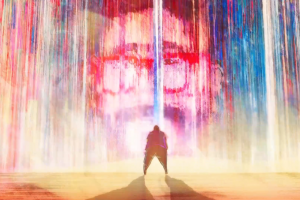
Switching back to animation, Five Years After the War layers in other unexpected moments after this moving reconciliation, exploring Tim’s growth into responsible manhood Suffice it to conclude that this mini docudrama has the heft and confidence not just of the world-renown animated features cited above, but other recent Jewish-themed animated shorts like The Driver is Red and The Red House from past NYJFF and DOC NYC festivals, also saluted in these columns. All combine unvarnished Jewish candor with an infusion of folkloric mystery, a quality that can best be described as piquant: the quintessential hidden gem.
Five Years After the War shows Mon.Jan.21 at 1:00pm and Tues.Jan.22 at 8:45pm.
Echo; Amikam Kovner & Assaf Snir; Israel, 2018; 98 min.
We know adultery dramas primarily through lifetimes of viewing American and French films noir. Echo isn’t quite an Israeli neo-noir but it bristles with essential noir elements —jealousy, betrayal, pursuit, revenge, death—not necessarily in that order. It’s a steadily absorbing portrait of a contemporary urban family coming apart: an intelligent, attractive wife with a clinical psychiatry practice, her hardworking engineer husband who supervises underground demolition and construction. They’re up-and-comers with a bright, likable 12-year-old daughter and younger son.
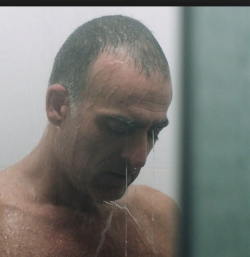
An opening, shrewdly observed scene hints at marital strains: Ella Halevi (Yael Abecassis) has gotten a small piece of a swab lodged in her ear, and her husband Avner (Yoram Toledano) helpfully offers to extract it. We sense she doesn’t like being touched, but when he eases the swab out, she’s relieved and grateful.
One morning Avner opens a printed traffic report in the mail and notices a photo taken through a car windshield of a woman who appears to be Ella, riding with a stranger. Avner stares at this photo a lot—under a magnifying glass we see it is Ella and reveals her hand and the stranger’s hand, touching. On impulse, Avner buys an in-home recording device that he installs and begins to monitor her phone calls. He gets an earful.
Directors Kovner and Snir let their discovery process leisurely build through Avner and Ella’s everyday activities—his sometimes dangerous work in the tunnels, her chatty phone calls to patients and colleagues, their teen daughter’s troubled request to mom to please pick her up after a movie she’s gone to with a boy. The directors understand the pinpoint nuances of ensnaring an audience—like letting their ominous musical rug purr under the first recorded conversation between Ella and—perhaps—this stranger in the photo, which we listen to as Abner helps his wife arrange her slip and bra for an evening out. The taped dialogues grow in intimacy as we watch Ella and Abner tuck in their children after an outing. Are you getting ensnared?
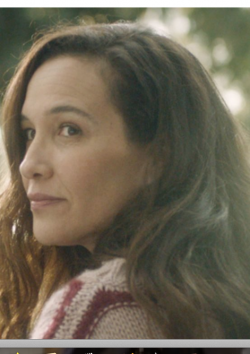
As the couple, Abecassis and Toledano mesh like perfectly machined parts. Her Ella is an enigmatic femme fatale, submitting to her husband’s lovemaking with a dutiful pleasure that may or may not be a performance. (“What about us? Are we animals?” she asks in a moment of telephone sex with her lover. “We’re rabbits,” he answers, and they laugh). Yorum Toledano’s Abner has s grave, measured authority mixed with bewilderment and hurt that may remind you of an Israeli Robert De Niro. (“Married women are the best,” a gym buddy advises the abject Abner. “They don’t want to meet the folks, they don’t want kids, they don’t sleep over.”)
Your viewer has vowed to write this critique without spoilers, so when Echo takes a sudden, wrenching turn barely 40 minutes in, be assured its directors are going to continue to explore—and resolve—the terrible dilemma they’ve so cleverly engineered up to that moment.
Kudos to Guri Alfi for a thoughtful and persuasive performance as Ella’s lover. A sweeping bow to Asher Goldschmid and Dori Media Paran for their music, a tippy-toe harbinger of doom in the tradition of Henry Mancini’s theremin in Experiment in Terror and Bernard Herrmann’s nervous supports through a slew of classics. Directors Kovner and Snir can be justly proud of having Echo win the Beracha Award from the Sam Spiegel International Film Lab in Jerusalem, a hugely supportive institution that’s helped develop world class pictures including Fill the Void, Son of Saul and The Kindergarten Teacher.
Echo shows Sat.Jan.12 and 9:30pm.
A Thousand Kisses; Richard Goldgewicht; Brazil/Ireland/Uruguay/USA, 2018; 16 min.
Make no mistake, the look of a short can influence how you view and remember it.The letters of Moses and Nettie Waldmann, respectively a Polish Jew and German Jew in 1933 Berlin, take on a strangely beautiful expression in Richard Goldgewicht’s animated love story.
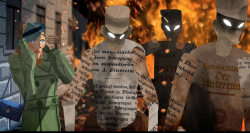
Both young people were fearful of Hitler’s growing encroachment. Moses was given the opportunity to leave via steamship for Rio de Janeiro, and a safer life as a door-to-door salesman. Nettie, who had a promising job at the elite Teitz department store, elected to hold on in Berlin. Moses promised to write her on his long journey, and eventually obtain entry papers at the Brazilian consulate for her, if and when she decided to join him.
The two stills shown here portray the nightmare Nettie began to experience in Berlin, and Moses’s dream of their reunion in Rio. When the Teitz store was taken over by the Third Reich, Nettie sensed she had to leave quickly, and did. The couple successfully reunited in late 1933. Goldgewicht’s triumph is not the conventional content of their letters, but how they’re framed.

For 16 minutes nearly, every scene looks like a burnished piece of antique luggage, the kind with exotic stickers you occasionally spot in a Brooks Brothers or Hammacher Schlemmer window display. Art director/illustrator Alan Dunne has collaged the handwritten letters and their stamps into continuing visual elements that underscore the lovers’ loneliness and longing. Watching his gorgeous creations integrated into scene after scene is like slipping into a 30’s diorama.
Moses is voiced by actor Christian Oliver, and Nettie by Elke Sommer. The director’s bio notes his affinity for traditional screen stars, and who could forget Ms. Sommer’s glory years that would fill a steamer trunk of Hollywood movies? At 78, Ms. Sommer’s global luggage ought to be stickered with a lifetime of film locales that A Thousand Kisses so fondly recalls.
A Thousand Kisses shows Mon. Jan. 21 and 5:30pm and Tue. Jan. 22 at 12:30pm.
Seder Masochism; Nina Paley; USA, 2018; 78 min.
What a funny, punny title for a Passover movie. Nina Paley seems to have become the unofficial Roz Chast of this 28th NYJFF.
Picture the rebel filmmaker Paley working virtually alone in her Urbana, Illinois home for years. Her opening prologue of female silhouettes frolicking with animal herds and a nonthreatening serpent is deceptively friendly. But the first title—“Written by God, Moses or A Series of Patriarchal Males, depending on whom you ask”—stakes out director/co-producer/animator Paley’s real agenda. First, though, a little entertainment: Moses, lit by God rays, and a herd of gazelles launch into a full-tilt, let’s-put-on-a-show, Busby Berkeley-style tap number. Oh boy.

Enter Jesus. He’s the talking head in a historic Last Supper painting, setting the stage for tonight’s Seder. Next up are the real stars of this father/daughter Passover set-to, Nina’s dad Hiram (1933-2012), seen as the bearded Holy Father in the scene shown, and Nina herself, represented by the young sacrificial goat. Their conversations, which will intersect the movie, were recorded in 2011, digging deep into Jewish culture and why dad seems to feel his daughter would have amounted to more if she hadn’t dropped out of college and become anything but an indie filmmaker. Nina is now 50. Oh boy oh boy.
Suddenly the actual Egyptian statues and Mesopotamian goddesses shown come to life and start bopping around. They sing! They dance! Moses hobbles on and off, not knowing what to make of all this. The Burning Bush launches into “Go Down Moses,” sung by Louis Armstrong with Moses now tentatively singing back-up. Another hooded dude may be blowing the shofar while Armstrong blows trumpet. And wait’ll you see The Ten Plagues—Blood, Frogs, Lice, Flies, Boils and so on, matched to suitable blues, bubble gum, pop, rock and hip hop tunes. The masochism part of the seder is on, complete with the requisite historical deaths and mummification of humans, animals, skeletons.

Paley’s Passover observations, like Chast’s everyday-life-dilemmas that have made her New Yorker’s sweetheart for decades, can be tough but her animation is rarely cruel. Most of Seder Masochism has the buoyant, goodhearted showbiz sensibility that once defined Broadway mega-musicals like Jesus Christ Superstar, Godspell and Joseph and The Amazing Technicolor Dreamcoat. This seder’s zesty song menu includes familiar tunes and anthems by John Lennon, Led Zeppelin, Gloria Gaynor, Guns N’ Roses, 10cc, the Pointer Sisters, plus Herb Albert & The Tijuana Brass. “Moses Supposes” turns up from Singin’ In The Rain. Andy Williams sings “This Land is Mine” from Exodus. Paley contributes her own “God is Male,” co-written with Connie Bryson, which she sings with Emilia Cataldo.
What’s definitely of-the-moment is Paley’s use of Moho Pro working at 24fps, which lets her match movement to song lyrics with absolute precision. She also uses Macromedia Flash 8, GIMP open-source photo editing software and warping animation to make characters frown and smile. She edits in 4K using a mix of Final Cut 5 and Final Cut X. (Tip of the hat to Jennifer Wolfe of Animation World Network for her tech interview info.)
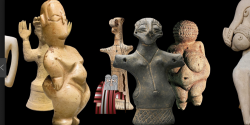
The one gnawing limitation to Paley’s film was best expressed by another writer, Variety’s Dennis Harvey in his 10/19/18 review: “Music rights issues (Paley is a professed ‘open source activist’ and ‘copyright abolitionist’) will complicate any prospective commercial distribution.”
As they say, Next Year in Jerusalem.
Seder Masochism shows Sun.Jan.13 at 9:00pm and Mon.Jan.14 at 5:45pm.
A Fortunate Man; Bille August; Denmark, 2018; 162 min.
The festival’s Closing Night selection is a fortunate choice, a long, lavish movie-movie that observant, not-so-observant and not-at-all observant Upper West Siders will settle into easily. It’s based on the 769-page Danish novel by Henrik Pontoppidan (Museum Tusculanum Press, 2018) whose trilogy of historical tales won the Nobel Prize for literature in 1917.
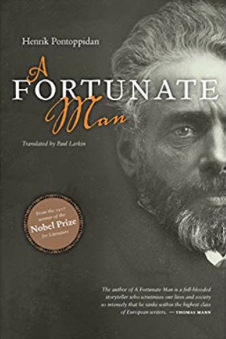
A Fortunate Man wrestles long and mightily with the most familiar Judeo-Christian conflict of them all: Can the poor, handsome, rural son of a Lutheran minister who migrates to Copenhagen find true happiness with the beautiful daughter of a wealthy Jewish tradesman? Can he find happiness at all? Should he even try?
Like Pontoppidan’s 19th century novel (Lykke-Per in Danish), Bille August’s opulent and episodic romance is a cautionary tale. It warns against leaving the strict, ordered disciplines of agrarian stability for a volatile, class conscious city life. Its mercurial hero, Per Sedenius (a calculating, camera-ready Esben Smed) moves away from his abusive and tyrannical father and begins studies at a national engineering college in Copenhagen.
Per’s a quick study on hydraulics, tides and wind, and senses Denmark’s entry to world trade will not be in Copenhagen but in an enlarged coastal harbor, joining a network of canals connecting the country’s cities and towns. And so, he designs it all. His impatient m.o. as a self-proclaimed visionary is “I stand alone on my own two feet in this world.” While he’s likable enough, we’ll notice he’s inventing a fake background, trying to walk out of a clothier in a suit he can’t possibly pay for, and borrowing money from the adoring local waitress whose bed he shares.
When Per’s blue-sky theories and blueprints are dismissed by his plodding classmates and tradition-bound professor, he goes hunting for a private patron. He lands a gatekeeper, Ivan Salomon (Benjamin Kitter, who’ll become Per’s amiable wingman). Ivan’s the son of wealthy entrepreneurs Philip and Lea Salomon (Tommy Kenter and Tammi Ost, both fine). They’re warm and welcoming, and Per finds himself vaulted into Copenhagen’s elite tier. The Salomons have two daughters—the perky, teasing Nanny (Julie Christiansen, a darling) who’s over-the-moon for Per, and the more elusive Jakobe (Katrine Greis-Rosenthal, who practically walks out of these sentences in Pontoppidan’s novel):
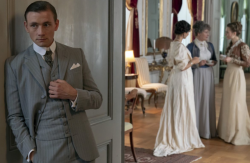
“She was widely famed for her intellectual capabilities, her will power and encyclopedic knowledge.…In spite of her physical frailty, she had grown into a state that bordered on beauty. Set within her face…were a pair of large sombre eyes, where the whites struck a strong blueish tone that at times could appear almost black. Those eyes of hers boasted an unforgettable gaze, proud and shy at one and the same time, and burning with loneliness and wide-ranging thoughts. Her figure was longer and taller than that of her brothers and sisters, a statue that was accentuated by her long slim legs and her curious way of walking with quick steps that never made a noise. Those rare mortals who had seen her truly smile, spoke of her beautiful teeth.”
She also speaks six languages. And she’s being pursued by a suitably Jewish but boring widower, Eybert (Rasmus Bjerg, ideal) who she doesn’t love. Per is smitten with her, as he crafts model windmills in his cold garret and sells off family heirlooms. The Salomon family is intrigued by his plans for a future based not on coal but on wind and waves, turbines and cables. Jakobe sees his visionary ideas breaking down prejudice and creating a “regenerated, just society.” When the city’s lead engineer rejects Per’s plans as naive and juvenile, the family agrees to financially underwrite his “Venice of the north,” securing him an engineering job in Austria and advancing him monies to pursue his inventions. “Go forth into the world,” urges Ivan. “Show them you’re a fortunate man!”

At the Salomons’ country villa, Per’s fortunes bloom. Sweaty and exhausted from briskly outrunning the family’s outing in a carriage, he declares his undying affection for Jakobe on bended knee, on a staircase. Look at the scene still—it’s the movie’s (and this festival’s) killer image, every bit as lush and seductive as Bradley Cooper and Lady Gaga about to melt into each other’s arms in A Star Is Born. And Jakobe falls for Per, body and soul. “Perhaps it was broad shoulders and manly arms that were needed,” wrote Poptoppidan over a century ago. At this juncture you’ll probably agree Per is indeed a fortunate man, but is Jakobe an equally fortunate woman?
Her mom wonders about this, too as she muses about “the rootless part of Per’s personality” at the wedding of Nanny, who’s quickly found a nice Jewish boy to marry. Mom’s concern is “whether Per’s Christian background will not clash with our Jewish faith.” But the family backs their engagement, and Jakobe travels to Austria to visit Per, who ignores his father’s passing and will ignore her pregnancy as well. “Exiled be he who defies The Lord,” warns Per’s heartbroken mother, who also visits him shortly before her own passing. He doesn’t attend her funeral, either.
Per’s given an ultimatum by the consortium of investors who’ve agreed to pay for his canal project, that he apologizes to Copenhagen’s supervising engineer who originally nixed his plans. Per refuses, and again insults the top administrator. He tells Jakobe that “this confirms the rotten connection between money and those in power!” Without government approval, Per’s vision of bringing Denmark into the 20th century is dashed.
He’s having—as you’re probably gathering by now—simultaneous crises of conscience, of faith, and of the heart, and you may feel a growing alarm that he’s starting to disappear before your eyes. Imagine what Jakobe must be feeling about her life. Much, much more will occur in the movie’s genuinely surprising and moving last hour.
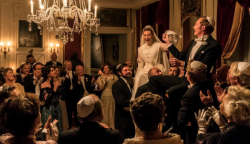
Director August’s adaptation, for which he shares screen credit with his son, Anders, stays remarkably close to Pontoppidan’s mammoth novel which, until this year, wasn’t available in English. The 70-year-old Oscar-winning director (Pelle the Conqueror) has said that “I more or less wrote the screenplay, and when we decided to make a television version, Anders came on board because he’s done so much TV and was very good at structuring the episodes.” The television series is reported to run 80 minutes longer.
Significantly, August is also well acquainted with the films of Ingmar Bergman, having been asked by Bergman to direct The Best Intentions, the three-hour 1992 drama which Bergman wrote about his parents’ ten flawed years of courtship and marriage. In that dramatized biopic (a Palme d’Or winner at Cannes), Henrik Bergman’s struggles as a poor theology student and unfaithful clergyman stand in vivid contrast to Anna Akerblom’s richly luxurious life in the early 1900s. The film strongly echoes Pers’ and Jakobe’s conflicting personas in A Fortunate Man. And it, too, was a longer television series, trimmed for its theatrical release. The Bergman connection also reminds us that the movie the much-married Swedish director ran more often than any other in his private viewing room on Faro was The Phantom Carriage, a 1921 drama of a broken man seeking forgiveness from his family.
Neither Mr. Smed nor Ms. Greis-Rosenthal are well known on American screens, and both actors are fresh faces, ideally cast to represent, respectively, the unfulfilled life vs. the fulfilled life. August’s ensemble cast is splendid, crafting a turbulent era of change in which Copenhagen’s Jewish upper class was viewed with envy as well as bitter, anti-Semitic distain. The production is panoramic and glorious, filmed in Copenhagen, Jutland, Lolland, Funer, and parts of Austria. View it on the largest screen you can find, starting with the Walter Reade theater.
A Fortunate Man shows Tues. Jan. 22 at 8:00pm. It will be introduced by Elisabeth Dyssegaard, Executive Editor at St. Martin’s Press.
This concludes critic’s choices. Watch for Brokaw’s picks at the 24th annual Rendez-vous with French Cinema, Feb. 28-March 10.
Regions: New York City
